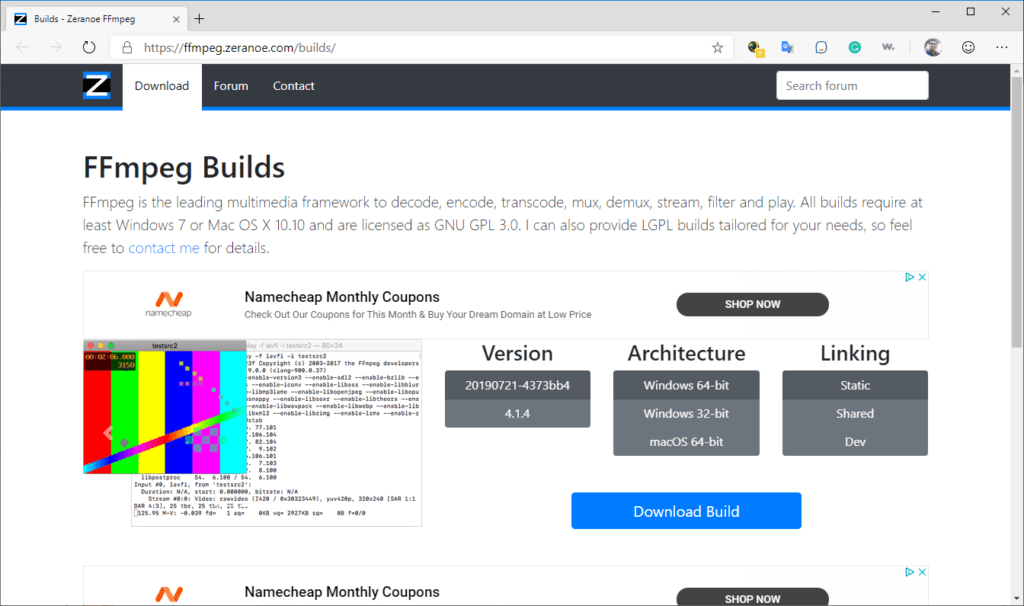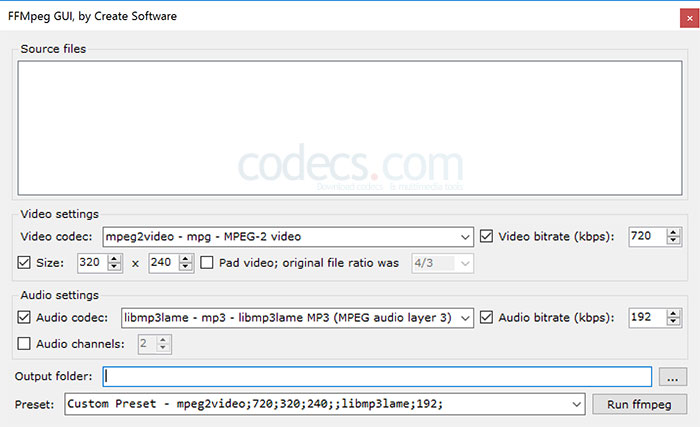More releases
FFmpeg is a powerful tool used for transcoding multimedia files. It is an open-source CLI tool that is available for all the major platforms. This program supports a wide range of audio and video libraries, including libavformat, libavutil, libavcodec, etc. FFmpeg can convert audio and video into different formats, resize and configure sample rates, and much more. 'Donating to help keep FFmpeg online is our way of giving back to the community'. Thanks Telepoint and MediaHub for their support! September 29th, 2015, GSoC 2015 results. FFmpeg participated to the latest edition of the Google Summer of Code Project. FFmpeg got a total of 8 assigned projects, and 7 of them were successful. Feb 02, 2011 GUI project is developed by ffmpeg fans and distributed for any usage. Non-free codecs in the included FFmpeg build may have further restrictions. May 06, 2021 Clever FFmpeg GUI is a small, but smart GUI for FFmpeg. It processes Audio and Video streams separately. These can be muxed after processing. It's for Windows Systems, portable, x86 and x64. Automatic stream detection, Video and Audio stream conversion, Audio volume detection, Audio lenght and pitch modification, automatic Video crop detection. FFmpeg (any version should work) SoX (tested only with this version) All these packages (dynamic libs and executables) need to be in LIBPATH and in PATH statements of the OS/2 or eCS CONFIG.SYS file. It is possible then to put a “shadow“ (similar to a link for unix systems) on the desktop or where the user desires.
If you find FFmpeg useful, you are welcome to contribute by donating. More downloading options
Get packages & executable files
FFmpeg only provides source code. Below are some links that provide it already compiled and ready to go.
Linux Packages
Linux Static Builds
Windows EXE Files
macOS
Get the Sources

You can retrieve the source code through Git by using the command:
FFmpeg has always been a very experimental and developer-driven project. It is a key component in many multimedia projects and has new features added constantly. Development branch snapshots work really well 99% of the time so people are not afraid to use them.
Git Repositories
Since FFmpeg is developed with Git, multiple repositories from developers and groups of developers are available.
| Clone URL | Description |
|---|---|
| Main FFmpeg Git repository | |
| https://git.ffmpeg.org/ffmpeg-web | Main ffmpeg.org website repository |
| https://git.ffmpeg.org/fateserver | fate.ffmpeg.org server software repository |
| Mirrors | |
| Mirror of the main repository | |
| Mirror of the website repository | |
| Mirror of the FATE server repository | |
Release Verification
All FFmpeg releases are cryptographically signed with our public PGP key and should be verified for authenticity.
To verify a release:
- Import our public key into your local keyring:
- Download a release tarball and its corresponding signature.
- Verify the signature:
Releases
Approximately every 6 months the FFmpeg project makes a new major release. Between major releases point releases will appear that add important bug fixes but no new features. Note that these releases are intended for distributors and system integrators. Users that wish to compile from source themselves are strongly encouraged to consider using the development branch (see above), this is the only version on which FFmpeg developers actively work. The release branches only cherry pick selected changes from the development branch, which therefore receives much more and much faster bug fixes such as additional features and security patches.
FFmpeg 4.4 'Rao'
4.4 was released on 2021-04-08. It is the latest stable FFmpeg release from the 4.4 release branch, which was cut from master on 2021-04-08.
It includes the following library versions:
FFmpeg 4.3.2 '4:3'
4.3.2 was released on 2021-02-20. It is the latest stable FFmpeg release from the 4.3 release branch, which was cut from master on 2020-06-08.
It includes the following library versions:
FFmpeg 4.2.4 'Ada'
4.2.4 was released on 2020-07-09. It is the latest stable FFmpeg release from the 4.2 release branch, which was cut from master on 2019-07-21.
It includes the following library versions:
FFmpeg 4.1.6 'al-Khwarizmi'
4.1.6 was released on 2020-07-05. It is the latest stable FFmpeg release from the 4.1 release branch, which was cut from master on 2018-11-02.
It includes the following library versions:
FFmpeg 4.0.6 'Wu'
4.0.6 was released on 2020-07-03. It is the latest stable FFmpeg release from the 4.0 release branch, which was cut from master on 2018-04-16.
It includes the following library versions:
FFmpeg 3.4.8 'Cantor'
3.4.8 was released on 2020-07-04. It is the latest stable FFmpeg release from the 3.4 release branch, which was cut from master on 2017-10-11.
It includes the following library versions:
FFmpeg 3.2.15 'Hypatia'
3.2.15 was released on 2020-07-02. It is the latest stable FFmpeg release from the 3.2 release branch, which was cut from master on 2016-10-26.
It includes the following library versions:
FFmpeg 2.8.17 'Feynman'
2.8.17 was released on 2020-07-07. It is the latest stable FFmpeg release from the 2.8 release branch, which was cut from master on 2015-09-05. Amongst lots of other changes, it includes all changes from ffmpeg-mt, libav master of 2015-08-28, libav 11 as of 2015-08-28.
It includes the following library versions:
Old Releases
Older versions are available at the Old Releases page.
Downloads of QWinFF are hosted at SourceForge: https://sourceforge.net/projects/qwinff/files/.
Latest stable QWinFF release is 0.2.1 on 2015-08-22 (changelogs)
Translation files included in the release are sometimes out-of-date because they are frequently updated. You can download the latest translation files (20140210) and copy all the *.qm files to the translation file directory (typically /usr/share/qwinff/translations on GNU/Linux and C:Program Files (x86)QWinFFtranslations on Windows).
QWinFF depends on the following programs at runtime:
- ffmpeg (required)
- ffprobe (required)
- ffplay or mplayer (optional, for previewing audio/video cutting)
- sox (optional, for adjusting audio speed)
QWinFF 0.2.1 Source Code (tar.bz2)
QWinFF 0.2.1 Source Code (tar.gz)
Or you can get latest development version from git repository:git clone 'git://github.com/qwinff/qwinff.git'
QWinFF 0.2.1 Installer: install QWinFF on your computer
QWinFF 0.2.1 Portable: Portable version that doesn’t require installation (7zip sfx)
PPA for QWinFF is available at https://launchpad.net/~lzh9102/+archive/qwinff. You can install from the ppa by the following command:
QWinFF packages for openSUSE are provided via openSUSE Build Service repositories. Supported releases are
- openSUSE 13.2
- openSUSE 13.1
- openSUSE 12.3
- openSUSE 12.2
- openSUSE 12.1
QWinFF packages for Fedora are also available via openSUSE Build Service. The following releases are supported currently:
Ffmpeg Gui 2019
- Fedora 20
- Fedora 19
- Fedora 18
- Fedora 17
NOTE: FFmpeg is not included in the official repository of Fedora. The recommended way to install ffmpeg on Fedora is using the rpm-fusion repository.
The complete installation process is as follow:
Ffmpeg Gui Osx
QWinFF is currently available on AUR.
contents
contents
Ffmpeg Gui Windows

QWinFF for OS/2 & eCS(eComStation) is now available
 here.
here.Ffmpeg Gui Reddit
To install QWinFF on OS/2 or eCS, the required packages are:- FFmpeg (any version should work)
- SoX (tested only with this version)
All these packages (dynamic libs and executables) need to be in
LIBPATH and in
and in PATH statements of the OS/2 or eCS CONFIG.SYS file.It is possible then to put a “shadow“ (similar to a link for unix systems) on the desktop or where the user desires. To start QWinFF, Double-click on the icon, or simply run
qwinff.exe in an OS/2 command line window.The runtimes listed above can be also installed via
rpm and yum, but those are only for eComStation and are still in development-stage (also the repository), you can get more infomation on this wiki.